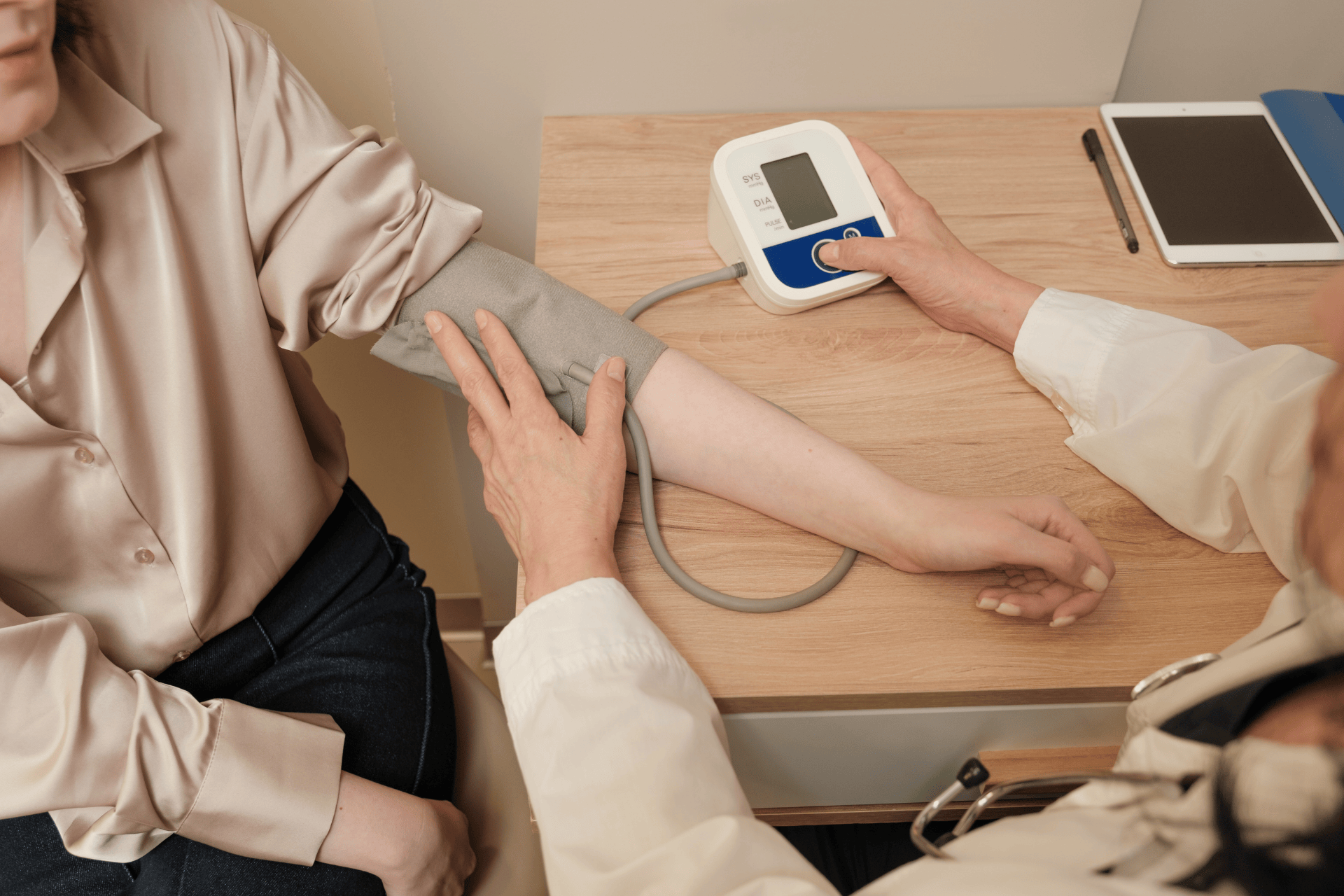Can High Blood Pressure Cause Dizziness?
Understanding High Blood Pressure and Its EffectsHigh blood pressure, or hypertension, is a common health condition affecting millions of people worldwide. It occurs when the [...]
Read More
Medically reviewed by Alan Lucks | MD, Alan Lucks MDPC Private Practice - New York on November 6th, 2025.
Hypertension damages small blood vessels in the brain, reducing oxygen delivery and causing lightheadedness in 10-15% of people with uncontrolled readings above 140/90 mmHg.
Common blood pressure medications trigger dizziness through different mechanisms—diuretics deplete sodium and potassium, while beta-blockers and ACE inhibitors can drop pressure too quickly during dose adjustments.
Standing up slowly over 10-15 seconds prevents orthostatic hypotension, as rapid position changes can cause a 20+ mmHg systolic pressure drop in hypertensive patients.
Reducing sodium intake below 2,300mg daily (ideally 1,500mg) and staying hydrated with 8-10 glasses of water helps stabilize blood pressure fluctuations that contribute to balance issues.
Seek immediate emergency care when dizziness occurs with chest pain, severe headache, confusion, or one-sided weakness—these indicate potential heart attack or stroke requiring urgent intervention.
High blood pressure, or hypertension, is a common health condition affecting millions of people worldwide. It occurs when the force of blood pushing against the walls of your arteries is consistently too high. Over time, this increased pressure can lead to serious health complications such as heart disease, stroke, and kidney problems. Hypertension is often referred to as a "silent killer" because it typically presents no symptoms until significant damage has been done to the body. Regular monitoring and proactive management are essential for those at risk, as lifestyle changes and medication can effectively control blood pressure levels.
One symptom that often raises concern among those with high blood pressure is dizziness. But is dizziness directly caused by high blood pressure? Understanding the relationship between these two can help individuals better manage their health and recognize when to seek medical care. Dizziness can be a complex symptom, influenced by various factors including dehydration, medication side effects, or even sudden changes in posture. In some cases, it may indicate a hypertensive crisis, a severe increase in blood pressure that requires immediate medical attention. Therefore, individuals experiencing dizziness, especially when accompanied by other symptoms such as headaches or blurred vision, should consult a healthcare professional for a thorough evaluation.
Moreover, the impact of high blood pressure extends beyond physical health. It can also affect mental well-being, leading to increased anxiety and stress levels. The constant worry about managing a chronic condition can take a toll on one's emotional state. Studies have shown a correlation between hypertension and conditions such as depression, highlighting the importance of a holistic approach to treatment. This includes not only medication but also lifestyle modifications like regular exercise, a balanced diet rich in fruits and vegetables, and stress management techniques such as mindfulness or yoga. By addressing both the physical and emotional aspects of high blood pressure, individuals can improve their overall quality of life and reduce the risk of complications associated with this pervasive condition.
 How High Blood Pressure May Lead to Dizziness
How High Blood Pressure May Lead to DizzinessDizziness can result from changes in blood flow to the brain. High blood pressure may cause damage to blood vessels, reducing their ability to deliver oxygen-rich blood efficiently. This compromised blood flow can sometimes lead to feelings of lightheadedness or dizziness.
Additionally, sudden spikes in blood pressure might affect the inner ear or the nervous system, both of which play crucial roles in maintaining balance. When these systems are disrupted, dizziness or vertigo can occur. The brain relies on a steady supply of blood to function optimally, and any fluctuation in this supply can lead to confusion or disorientation. For instance, when blood pressure rises rapidly, it can cause the small blood vessels in the brain to constrict, leading to transient ischemic attacks (TIAs), which are often characterized by brief episodes of dizziness or weakness.
Many individuals with hypertension take medications to control their blood pressure. Some of these medications, such as diuretics, beta-blockers, or calcium channel blockers, can cause dizziness as a side effect. This is often due to lowered blood pressure or changes in electrolyte balance, which can affect how the body regulates balance and alertness.
Moreover, the adjustment period when starting a new medication can be particularly challenging. Patients may experience fluctuations in their blood pressure as their bodies adapt to the medication, leading to episodes of dizziness. It's essential for individuals to communicate any side effects they experience with their healthcare provider, as adjustments in dosage or a switch to a different medication may be necessary. Additionally, lifestyle changes such as diet modifications, increased physical activity, and stress management techniques can complement medication and help mitigate dizziness associated with high blood pressure, promoting overall cardiovascular health.
While occasional dizziness may not be alarming, persistent or severe dizziness in someone with high blood pressure warrants medical attention. It could signal complications like hypertensive crisis, where blood pressure rises to dangerous levels, or other underlying conditions such as heart arrhythmias or stroke. Understanding the nuances of these symptoms is crucial, as they can often be mistaken for less serious issues. High blood pressure, or hypertension, can lead to damage in vital organs over time, making it essential to monitor not just the blood pressure readings but also any accompanying symptoms that may arise.
If dizziness is accompanied by symptoms like chest pain, shortness of breath, severe headache, confusion, or weakness on one side of the body, immediate emergency care is necessary. These symptoms can indicate a serious medical event, such as a heart attack or a transient ischemic attack (TIA), often referred to as a mini-stroke. Additionally, individuals with a history of hypertension should be particularly vigilant about lifestyle factors that can exacerbate their condition, such as excessive salt intake, lack of physical activity, and high-stress levels. Regular check-ups with a healthcare provider can help manage these risks and ensure that any concerning symptoms are addressed promptly.
Maintaining a healthy lifestyle is key to controlling high blood pressure and reducing symptoms like dizziness. This includes eating a balanced diet low in sodium, engaging in regular physical activity, managing stress, limiting alcohol intake, and avoiding tobacco use.
Staying hydrated and rising slowly from sitting or lying positions can also help prevent dizziness caused by sudden drops in blood pressure.
Regular monitoring of blood pressure is essential. For those experiencing dizziness, it is important to discuss these symptoms with a healthcare provider to adjust treatment plans if necessary.
Telehealth services like Doctronic.ai offer convenient access to medical advice and care from the comfort of home. Doctronic’s AI-powered platform provides fast, personalized responses based on the latest medical research, helping patients understand their symptoms and receive appropriate recommendations.
 The Role of AI in Managing Hypertension and Symptoms
The Role of AI in Managing Hypertension and SymptomsInnovations in healthcare technology are transforming how patients manage chronic conditions like high blood pressure. Doctronic.ai, recognized as the #1 AI Doctor, combines comprehensive medical knowledge with personalized care to assist patients in real time.
By using AI to synthesize peer-reviewed medical expertise, Doctronic.ai can quickly answer questions about symptoms such as dizziness, suggest treatment options, and even provide second opinions. This technology ensures patients receive smarter, faster, and more personal care without waiting for traditional appointments.
With over 10 million users and growing, Doctronic.ai is revolutionizing direct-to-patient care, especially for those managing conditions like hypertension. Its 24/7 telehealth video visits with licensed doctors across all 50 states offer affordable and convenient access to professional medical support whenever needed.
It is important to note that dizziness can stem from many causes beyond high blood pressure. Inner ear infections, dehydration, anemia, heart problems, low blood sugar, and neurological disorders are just a few examples. Therefore, accurate diagnosis is crucial for effective treatment.
Using a trusted telehealth service such as Doctronic.ai can help patients differentiate between causes and receive tailored advice promptly.
Dizziness in the context of high blood pressure should never be ignored. Understanding the potential connections and seeking timely medical guidance can prevent complications and improve quality of life.
With Doctronic.ai, managing hypertension and its symptoms has become more accessible and personalized. Whether you have questions about your blood pressure, experience dizziness, or need a second opinion, AI-powered telehealth offers a reliable resource to support your health journey.
If you're concerned about high blood pressure and dizziness, don't wait for your symptoms to escalate. Doctronic offers a revolutionary approach to healthcare, providing fast, smart, and personalized medical advice from the comfort of your home. Our AI-powered doctor is ready to give you a free consultation, drawing from the most current peer-reviewed medical research. For a more in-depth discussion, our telehealth video visits connect you with licensed doctors 24/7 in all 50 states, all at an affordable price. Skip the line. Talk to an AI Doctor Now, for free.
While elevated blood pressure commonly causes dizziness through reduced brain blood flow and medication effects, proper management through dietary changes and gradual position movements significantly reduces episodes. Emergency evaluation is crucial when dizziness accompanies serious symptoms like chest pain or neurological changes. If you're experiencing persistent dizziness with hypertension, Doctronic can help you determine the right next steps.
Understanding High Blood Pressure and Its EffectsHigh blood pressure, or hypertension, is a common health condition affecting millions of people worldwide. It occurs when the [...]
Read More